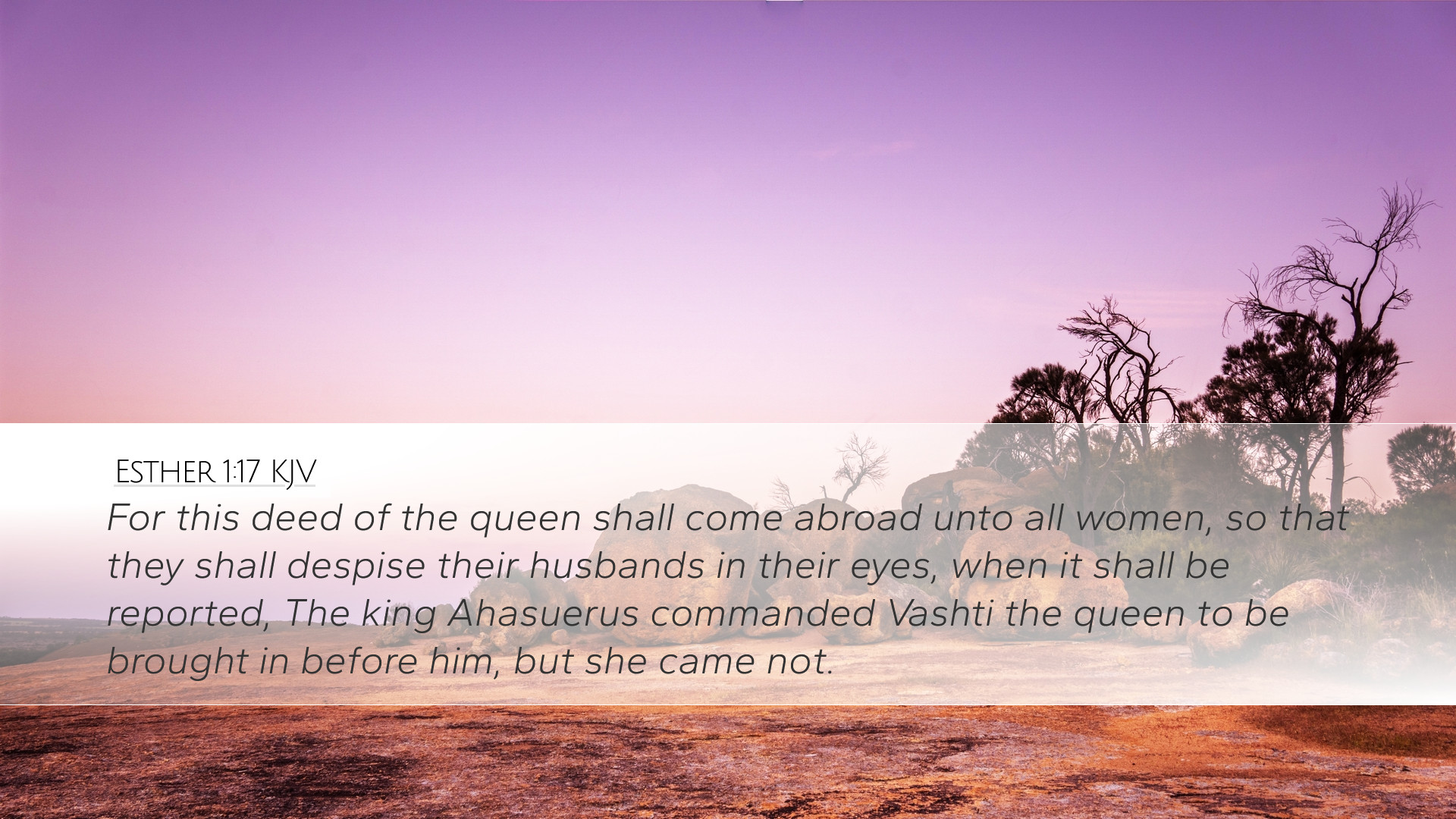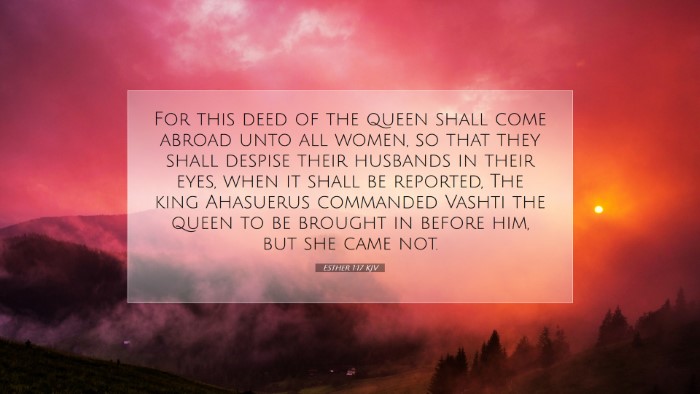Old Testament
Genesis Exodus Leviticus Numbers Deuteronomy Joshua Judges Ruth 1 Samuel 2 Samuel 1 Kings 2 Kings 1 Chronicles 2 Chronicles Ezra Nehemiah Esther Job Psalms Proverbs Ecclesiastes Song of Solomon Isaiah Jeremiah Lamentations Ezekiel Daniel Hosea Joel Amos Obadiah Jonah Micah Nahum Habakkuk Zephaniah Haggai Zechariah MalachiEsther 1:17
Esther 1:17 KJV
For this deed of the queen shall come abroad unto all women, so that they shall despise their husbands in their eyes, when it shall be reported, The king Ahasuerus commanded Vashti the queen to be brought in before him, but she came not.
Esther 1:17 Bible Commentary
Bible Commentary on Esther 1:17
Esther 1:17 states, "For this deed of the queen shall come abroad unto all women, so that they shall despise their husbands in their eyes, when it shall be reported, The King Ahasuerus commanded Vashti the queen to be brought in before him, but she came not." This verse is an elaborate depiction of the consequences of Queen Vashti's refusal to obey King Ahasuerus' command.
Contextual Overview
This incident occurs during a grand banquet hosted by King Ahasuerus, or Xerxes, where he boasts of his wealth and power. Vashti's disobedience is not merely a personal affront but a potential challenge to the mores of the Persian court and societal expectations regarding women's behavior.
Insights from Commentary
Matthew Henry's Commentary
Matthew Henry points out that Vashti’s refusal signifies a turning point in the dynamics of the royal household and the broader implications for gender roles during the Persian Empire. Her act of defiance sends a message about the strength of women’s agency, which Henry considers significant in revealing both the nature of Vashti’s character and the expectations imposed upon her. He notes:
- Public Perception: Henry argues that the king’s response to Vashti's rebellion anticipates a ripple effect among women of the kingdom, potentially leading them to disregard their husbands in similar fashion. This reflects the importance of public behavior in maintaining societal norms.
- Anticipated Consequences: He emphasizes the fear the king had concerning the influence of Vashti's actions; her defiance could inspire other women to follow suit, causing unrest in households, which could ultimately threaten the stability of the kingdom.
Albert Barnes' Notes
Albert Barnes elaborates on the implications of Vashti's actions, suggesting that the king’s need to assert authority is rooted in both personal pride and the potential threat of insubordination amongst his subjects. He states:
- Authority and Respect: Barnes articulates that the king viewed Vashti’s refusal as an intrinsic challenge to his authority not just as a husband but as a king. This incident underscores the societal expectations for wives to exhibit subservience, which reflects broader patriarchal norms.
- Pride and Honor: Barnes suggests that the episode reveals the tension between personal honor and public duty, as the king's pride is wounded not only by his wife's refusal but by the implications it carries for his reign.
Adam Clarke's Commentary
Adam Clarke brings attention to the cultural context, emphasizing how Queen Vashti's disobedience could have far-reaching effects on the perception of women in leadership roles. He provides insights such as:
- Potential Rebellion: Clarke notes that Vashti’s refusal to appear could lead to widespread discontent among women, suggesting they may feel empowered to resist their husbands similarly. He highlights the psychological impact this could have in a patriarchal society.
- Moral Leadership: Clarke argues that the king's decision to punish Vashti can be seen as an attempt to preserve moral standards in a rapidly changing societal framework. He notes the irony that in aiming to enforce compliance, the king may inadvertently highlight the growing desire for independence among women.
Theological Reflections
This verse and its surrounding commentary prompt several theological reflections relevant to contemporary audiences:
- God's Sovereignty: The narrative, though set in a secular context, underscores God’s sovereignty in using unexpected events for His divine purposes. Vashti's refusal sets into motion God's plan to elevate Esther, illustrating how God works through human actions and societal upheaval.
- Gender Dynamics: The discourse surrounding this verse challenges readers to engage with contemporary issues of gender and authority, inviting discussions on the roles of men and women in both secular and spiritual domains.
- Obedience and Integrity: Vashti’s stand raises pertinent questions about the moral integrity necessary in leadership roles. It serves as a reminder that leaders must sometimes make difficult choices that may not align with societal expectations but are crucial for maintaining personal integrity and the greater good.
Conclusion
Esther 1:17 provides rich material for reflection on themes of authority, gender dynamics, and divine purpose. Public domain commentaries contribute valuable insights that remain relevant for pastors, students, theologians, and Bible scholars today. The verse encapsulates the tension between personal conviction and societal expectations, encouraging deeper engagement with the complexities of leadership and the nuanced roles of women in biblical narratives.


